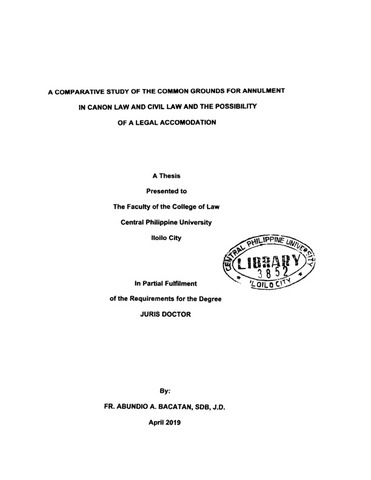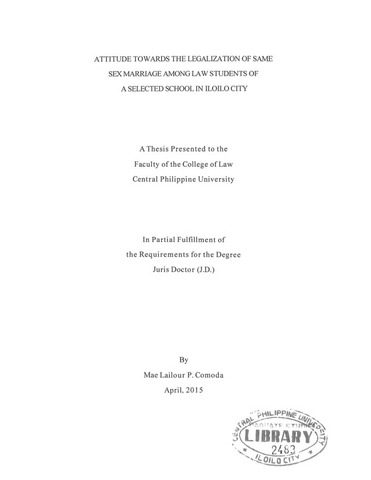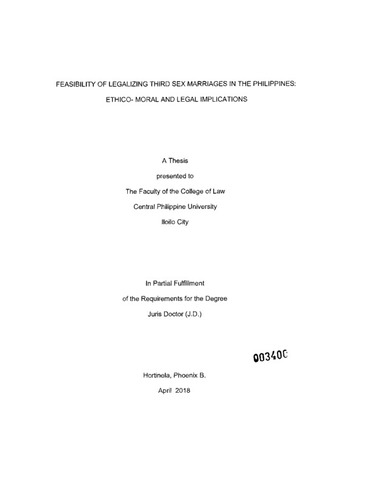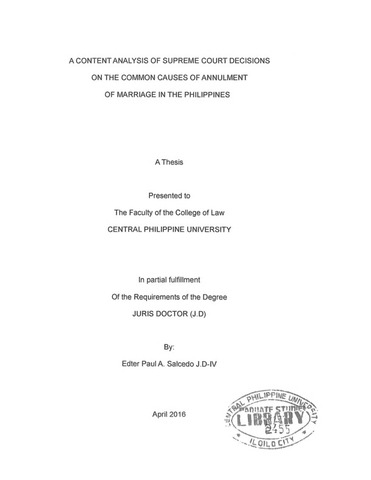A comparative study of the common grounds for annulment in canon law and civil law and the possibility of a legal accommodation
| dc.contributor.adviser | Alibogha, Salex E. | |
| dc.contributor.author | Bacatan, Abundio A. | |
| dc.coverage.spatial | Philippines | en_US |
| dc.date.accessioned | 2021-06-29T02:25:36Z | |
| dc.date.available | 2021-06-29T02:25:36Z | |
| dc.date.issued | 2019 | |
| dc.identifier.citation | Bacatan, A. A. (2019). A comparative study of the common grounds for annulment in canon law and civil law and the possibility of a legal accommodation (Unpublished postgraduate thesis). Central Philippine University, Jaro, Iloilo City. | en_US |
| dc.identifier.uri | https://hdl.handle.net/20.500.12852/1111 | |
| dc.description | Abstract only | en_US |
| dc.description.abstract | This study conducted a point-by-point comparison of law of the Roman Catholic Church and the law of the Republic of the Philippines with regard to the grounds for annulment and the process that is involved in their respective tribunals. Using the Lens Comparison Method, the study sought to find the common elements between these two laws that govern the dissolution of marriage. From these comparisons, the researcher discovered that the common elements found in the grounds for annulment and in their respective processes are sufficient to substantiate the claim that to a certain degree, a legal accommodation by the State in recognizing annulments decided by the Ecclesiastical Authority, is indeed possible. This finding is presented in the context of so many unsuccessful marriages occurring in the country today. From the demonstrations of such close similarities between both Civil and Canon laws in terms of grounds for an invalid or voidable marriage, and those rules followed in Church and judicial courts, the research makes a serious argument as to why an annulled marriage declared to be so by a Church tribunal should be good enough to be admitted by the Judicial court of the State. Considering that there have been similar proposals expressed in two bills filed at the House of Representatives for reasons based on different grounds, this study puts forward the same proposal but based on a serious legal ground that an annulled marriage declared to be so in a Church tribunal has complied with the demands of due process as if it were done in a Judicial court. | en_US |
| dc.format.extent | vii, 98 leaves | en_US |
| dc.language.iso | en | en_US |
| dc.rights | Attribution-NonCommercial-NoDerivs 3.0 Philippines | * |
| dc.rights.uri | http://creativecommons.org/licenses/by-nc-nd/3.0/ph/ | * |
| dc.subject.ddc | Law Library 340.72 B12 2019 | en_US |
| dc.subject.lcsh | Canon law | en_US |
| dc.subject.lcsh | Marriage (Canon law) | en_US |
| dc.subject.lcsh | Marriage--Annulment (Canon law) | en_US |
| dc.subject.lcsh | Civil law | en_US |
| dc.subject.lcsh | Marriage | en_US |
| dc.subject.lcsh | Marriage law | en_US |
| dc.subject.lcsh | Marriage--Annulment | en_US |
| dc.subject.lcsh | Philippines | en_US |
| dc.subject.lcsh | Catholic Church | en_US |
| dc.title | A comparative study of the common grounds for annulment in canon law and civil law and the possibility of a legal accommodation | en_US |
| dc.type | Thesis | en_US |
| dc.description.bibliographicalreferences | Includes bibliographical references | en_US |
| dc.contributor.chair | Bedona, Zacarias D. Jr. | |
| dc.contributor.department | College of Law | en_US |
| dc.description.degree | Juris Doctor | en_US |
Files in this item
This item appears in the following Collection(s)
-
Juris Doctor [144]






